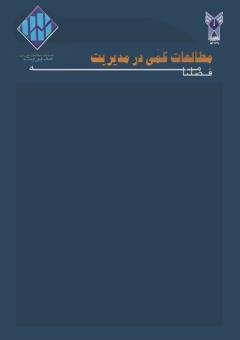امکان سنجی مدیریت شهری هوشمند در صنعت ساختمان در شرایط رکود بر پایه تاب آوری شهر ها
محورهای موضوعی : مدیریتامیرمحمد محتشم 1 , تقی ترابی 2 * , رضا رادفر 3 , محمدرضا معتدل 4 , نازنین پیله وری 5
1 - دانشجوی دکتری گروه مدیریت صنعتی دانشگاه آزاد اسلامی واحد امارات
2 - دانشیار گروه علوم اقتصادی دانشگاه آزاد اسلامی واحد علوم و تحقیقات
3 - استاد تمام گروه مدیریت و سیستمها دانشگاه آزاد اسلامی واحد علوم و تحقیقات
4 - استادیار گروه مدیریت صنعتی، دانشگاه آزاد اسلامی واحد تهران مرکز
5 - دانشیار گروه مدیریت صنعتی، دانشگاه آزاد اسلامی واحد تهران غرب
کلید واژه: مدیریت شهری, شهر هوشمند, تاب آوری, رکود, صنعت ساختمان,
چکیده مقاله :
با گذشت چهارنسل تحول نظری و تجربی شهر هوشمند، انتظار بر این بود که با اتکا بر تکنولوژی هایی نظیر اینترنت اشیا، هوش مصنوعی، رایانش ابری و نظایرآن، این نظریه راه کار مواجهه با مسأله و حل پیچیدگی های برنامه ریزی تاب آوری باشد. لکن پژوهش های بی شمار اخیر، مبین خلاف آن است. ریشه مسأله نه درکاربست تکنولوژی بلکه درتلفیق نظری مدیریت شهر هوشمند و تاب آوری شهری است. در این میان در حال حاضر رویکرد تابآوری دیدگاه جدیدی است که به جای تمرکز بر کاهش آسیب پذیری و نگاه مقابلهای به افزایش تابآوری و انعطافپذیری شهرها در برابر مخاطرات طبیعی و انسانی تأکید میکند. هدف از انجام این تحقیق امکان سنجی مدیریت شهری هوشمند بر ارتقا تاب آوری شهر ارومیه است. برای رسیدن به این هدف از روش تحقیق توصیفی- تحلیلی بر اساس تحلیل پرسشنامهای که توسط 30 نفر از خبرگان و متخصصان شهری تکمیل شده بهره گرفته شد. نتایج حاصل از تجزیه و تحلیلهای آماری نشان میدهد که شهر ارومیه به لحاظ تابآوری اجتماعی و زیرساختی در حد نسبتاً مطلوب قرار دارد اما از نظر تابآوری نهادی- مدیریتی، اقتصادی و کالبدی- محیطی دارای وضعیت مطلوبی نیست. در مجموع تابآوری کلی شهر ارومیه از نظر متخصصان پایینتر از حد مطلوب میباشد، بهطوری که مقدار محاسبه شده تابآوری کلی شهر ارومیه 2.90 که کمتر از حد میانگین (3) است.
With the passage of four generations of theoretical and experimental development of the smart city, it was expected that by relying on technologies such as the Internet of Things, artificial intelligence, cloud computing, and the like, this theory would be the way to face the problem and solve the complexities of resilience planning. But countless recent researches show the opposite. The root of the problem is not in the application of technology, but in the theoretical integration of smart city management and urban resilience. In the meantime, the resilience approach is a new perspective that instead of focusing on reducing vulnerability and looking at confrontation, emphasizes increasing the resilience and flexibility of cities against natural and human hazards. The purpose of this research is to evaluate the feasibility of smart urban management to improve the resilience of Urmia city. To achieve this goal, a descriptive-analytical research method was used based on the analysis of a questionnaire completed by 30 urban experts and specialists. The results of the statistical analysis show that Urmia city is relatively favorable in terms of social and infrastructural resilience, but it does not have a favorable situation in terms of institutional-management, economic and physical-environmental resilience. In general, the overall resilience of Urmia city is lower than the optimal level according to experts, so that the calculated value of the overall resilience of Urmia city is 2.90, which is lower than the average level (3).

